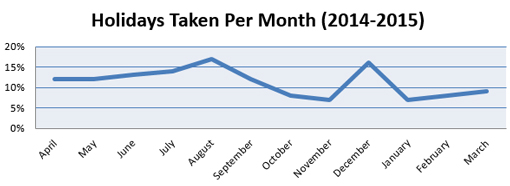Rachel Lane explains how you can enable your agents to book any holiday they like – with only 4 weeks’ notice.
Having worked in resource planning for over 15 years now, holiday booking is still one of the most contentious issues that I see schedulers and intra-day teams face on a regular basis. It’s therefore very refreshing to work for a company who decided to take a risk and give its agents the freedom to book the holidays they want with only four weeks’ notice.
The freedom to book holidays agents actually want is a fantastic benefit
The holiday process, called “Freedom Holiday”, has been in place within our organisation for over 12 months now and is working extremely well. Giving our agents the freedom to book the holidays they actually want is a fantastic staff benefit and one that has been welcomed by our teams.
The key to making Freedom shifts work is the same as completing a successful shift review – we need to talk to our agents!
So many times in planning we make assumptions about what our agents want or need. When creating new shift patterns we often shy away from shifts that would benefit the business because we feel that we couldn’t get the agents to work them. With holiday booking it’s the same – most people would say ‘we can’t give everybody the freedom to book whatever holidays they want – they will all want the same weeks off!’
We can still meet our performance targets by being prepared
The reality is that holidays are spread out quite evenly across the year. The graph below shows the percentage holidays booked per month through our holiday year 2014-2015. It’s probably not dissimilar to the percentages many companies would budget for within their capacity plans anyway.

We can still meet our performance targets by being prepared.
Yes, we could end up with more people off at Christmas than we would have allowed with a percentage allocation. However, we can still meet our performance targets by reducing other shrinkage and by being prepared.

So how do we make this work?
We all have a good awareness of where our ‘breaking points’ are, that is, at what point high shrinkage really does start to impact on our performance. When we know and understand that, we know what to look out for.
Throughout the year we review the current holidays booked on a weekly basis. We’ve found that because they have the freedom to book what they need and what they want, a lot of people will book early.
There’s less movement because agents are getting the dates they want
There’s less movement because people are actually getting the dates they want and not ‘panic booking’ other dates just to make sure they get something.
Our management information team produce a weekly report that highlights any dates with over 15% holidays booked. We then know that these are the dates to watch. By being aware of these well in advance we can start to mitigate any risks by being more creative with our shift patterns, reducing non-essential shrinkage on those dates and being ready to provide multi-skilling options/back-office support if required.
The reality is, we’re not doing anything new here, these are all things we need to react to when we have other areas of high shrinkage. We can all have peaks in sickness, or widespread training that needs to take place. The difference is, with sickness and often with training, we don’t have much time to plan or react to the increases in shrinkage. With our “Freedom Holiday” process, we are guaranteed to have at least four weeks’ notice to prepare and plan.

We also monitor percentage of holidays booked on a weekly basis. We class this in sections from number of agents who are yet to book any holidays to those who have booked close to or up to the maximum allocation of 30 days. We encourage those who haven’t booked any or who have booked very few to choose their holidays, and this helps us to gauge whether our existing high percentage holiday dates are at greater risk.
Again, we can always talk to our agents about the holidays they have booked if we can see a significant performance risk. For example, one area had a high volume of holidays booked on a Tuesday after a bank holiday (they were closed for the bank holiday itself). We spoke to the teams and explained the impact that this could have on the people who remained in work to take the calls (absence makes your friends work harder!). We found that mostly people were just looking for a long weekend off and so some were happy to change their holiday to the Friday before, therefore levelling out the percentages across the weekend.
We have teams of as few as ten that have signed up to “Freedom Holidays”
You might think that a process like this could only work in a large-scale operation. However, we have teams of as few as ten that have signed up to “Freedom Holidays”. This does require a bit more attention, as obviously the fewer people, the bigger the impact.
We had one example last year where a member of this team was getting married on a working day. Many of the team were invited and we had a 50% holiday shrinkage for this particular day. To reduce performance issues, we asked the remaining members of the team to work additional hours that day, which we then gave back to them at a time to suit them. We cancelled all other non-essential shrinkage and made sure any outbound dialling, admin work etc. was completed before that date where possible so that our open time was at a maximum.
Did we hit service level that day? Admittedly, no. But we did maintain a reasonable abandoned rate and our average time to answer wasn’t significantly increased, so we minimised the customer impact as much as possible. However, this is just an example of a very few days across the company that we felt an impact as a result.
The positive impact on work–life balance far outweighs the risk

Does this mean we would retract the “Freedom Holiday” process? Not at all. We will always need to take performance risks from time to time, whether that’s due to essential training, increased attrition or for any number of reasons. Our aim is to balance the customer needs while making this a great place to work. The agent feedback, the improvement in the relationship between planning and the operation and the positive impact on work–life balance far outweighs the risk.
Allowing a Freedom Holiday process isn’t necessarily easy. It means taking risks, monitoring closely and understanding that, at times, increased holiday shrinkage will mean busy days that will need more intra-day support and less availability for our teams.
Our agents have told us…
- “Allowing people to have their holidays, without capping days, increases morale.”
- “It takes a lot of stress off people and I am able to book a cheap holiday and know it will be approved.”
- “There are times when there are a lot of people off at one time but we all just muck in and work through it, which we have no problem doing.”
- “Taking the pressure off booking holidays makes even the more difficult times worthwhile.”
Following the success of this, we now also have Freedom Lunches and we’re looking at options for Freedom Shifts. We’ve just gone live in one team with a Freedom Shift process that gives them the ability to choose the shifts they want to work for 5 out of 7 weeks, with the remaining two weeks being scheduled against requirements by the planning team.

Rachel Lane
Initially we surveyed the team and asked them if they were happy with their shift patterns. 50% of them said no and only 38% said yes. We’re now in month four of Freedom Shifts and, having recently sent out a new survey, the results have changed dramatically. We now have 89% of people who say they are happy with their shift pattern, and 0% who tell us they are unhappy. Feedback has been fantastic – “I don’t mind covering for people anywhere near as much, as I get to do my shift preference most of the time.”
“I feel the freedom shift allows me to spend more time with my family.”
“Great. I love it. Love the flexibility having worked here 11 years, this is the best thing the company has offered.”
With thanks to Rachel Lane
Author: Megan Jones
Published On: 24th Jun 2015 - Last modified: 13th Aug 2025
Read more about - Workforce Planning, Employee Engagement, Scheduling, Workforce Planning





































Interesting article. This sounds great from an agent’s point of view and I can certainly see the benefits in morale and reduced sickness. However, I’m not sure I look forward to the first day where we miss our service target and I have to explain that I allowed 20% of our staff to be off at the same time. I agree in having an increase in holiday allowance if they give 4 weeks notice so we have time to plan alternatives, but I’m not sure about having it unlimited.